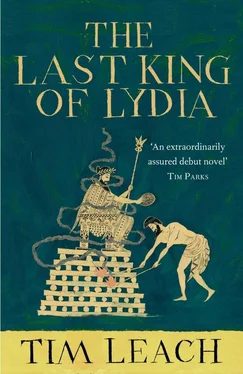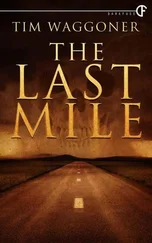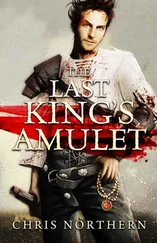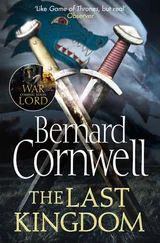Tim Leach - The Last King of Lydia
Здесь есть возможность читать онлайн «Tim Leach - The Last King of Lydia» весь текст электронной книги совершенно бесплатно (целиком полную версию без сокращений). В некоторых случаях можно слушать аудио, скачать через торрент в формате fb2 и присутствует краткое содержание. Год выпуска: 2013, ISBN: 2013, Издательство: Atlantic Books Ltd, Жанр: Исторические приключения, на английском языке. Описание произведения, (предисловие) а так же отзывы посетителей доступны на портале библиотеки ЛибКат.
- Название:The Last King of Lydia
- Автор:
- Издательство:Atlantic Books Ltd
- Жанр:
- Год:2013
- ISBN:9780857899200
- Рейтинг книги:5 / 5. Голосов: 1
-
Избранное:Добавить в избранное
- Отзывы:
-
Ваша оценка:
- 100
- 1
- 2
- 3
- 4
- 5
The Last King of Lydia: краткое содержание, описание и аннотация
Предлагаем к чтению аннотацию, описание, краткое содержание или предисловие (зависит от того, что написал сам автор книги «The Last King of Lydia»). Если вы не нашли необходимую информацию о книге — напишите в комментариях, мы постараемся отыскать её.
The Last King of Lydia — читать онлайн бесплатно полную книгу (весь текст) целиком
Ниже представлен текст книги, разбитый по страницам. Система сохранения места последней прочитанной страницы, позволяет с удобством читать онлайн бесплатно книгу «The Last King of Lydia», без необходимости каждый раз заново искать на чём Вы остановились. Поставьте закладку, и сможете в любой момент перейти на страницу, на которой закончили чтение.
Интервал:
Закладка:
‘It was just for you. I hope he was not so shy when he took you as his wife.’
She flinched. ‘My lord-’
‘Forgive me. I knew him so well when he was a boy. But they grow away from us, our children. There comes a time when we don’t know them at all. You must have known him better as a man than I did. I wish I could have known him as you did.’ Croesus blinked, and did not understand why he still could not see. It was not until he put a hand to his face that he realized he was weeping.
She looked up at him, and he saw pity in her eyes. He took her hand. He felt her tense, but she did not pull away. He leaned forward, and kissed the top of her head. He felt her relax slightly at the fatherly gesture. Then, with his other hand, he tipped up her chin and kissed her mouth.
She submitted to the kiss, but when he tried to take another, she turned her head away.
‘I can’t,’ she said.
He said nothing.
‘Please. Let me go.’
‘You owe me a son.’
‘Let me go. Please, my lord.’ She stood, hesitant, and looked again at the door.
He stood up and seized her arms. She twisted out of his hands and he felt a sudden anger at how easily she escaped him. He seized her again, gripping tighter this time until she cried out in pain. He shook her, once, like a dog shaking a rat, and she turned her face away and closed her eyes.
He put one hand to her robe. He had the idea that he should tear it loose, that this was what he should do next. He tugged hard, but the heavy fabric held firm, and he merely spun her around and pulled her off balance. Then he hit her, an open-handed slap to the face; he regretted it at once. It wasn’t necessary.
He put his hands into the folds of her clothes, searching for the place where he could loosen the fabric, his eyes firmly fixed on her body, away from her face. He tugged, frustrated, until at last the stubborn folds began to come away. Inside her robe, he felt his hand touch cold skin.
Now he had to get her to the floor. She stood rigid, unresisting but not acquiescent, and he pressed a hand on her shoulder and a hand on her throat to push her down. She fell awkwardly; the harsh slap of skin against stone echoed through the chamber. She sobbed once, and from the door she heard the creak of leather and metal. One of the guards outside, shifting uneasily from one foot to another. Only a few feet away, unable and unwilling to help her.
Croesus knelt beside her, raised his hands to her again and opened her robe. He went quite still. She opened her eyes and looked at him. He stared at her body, his eyes hidden from her. Hesitant, fearful of what she might provoke, she placed her hands on his shoulders, and pushed them back until she could see his face.
He did not meet her gaze. She felt his hands trembling.
‘Croesus?’ she said softly.
Slowly, he lay down beside her and bowed his head, his shoulders shaking. She breathed heavily, her arms limp by her side. She pulled her robe to her. Then, slowly, she rolled to her side and embraced him on the ground, holding his head against her stomach.
He wept against her empty body, the tomb of his hopes. The place he wished to bury another son, but could not.
On top of Atys’s barrow, two guards sat in the dust and cast dice for pieces of copper beside the embers of the fire. When the sun rose, the priests would come to bury the ashes deep within the barrow. It would be placed in a hidden chamber, away from the centre, in an attempt to mislead the swarms of grave robbers who visited the barrows like jackals in the night, mining for the gifts of the dead. Until the morning came, the guards were to watch over the casket, to ensure that no thief came to take the treasures from it.
Some time after midnight, they heard a sound in the darkness. Someone was walking towards them. They did not get to their feet to issue a challenge. A robber would not be so careless. Before night had fallen, they had seen the figure up on the hills. They knew who was coming, and when Adrastus came into the light of the fire, they did nothing more than nod once at him before returning to their game.
Adrastus stared at the casket. He thought of the moment when the spear had left his hand. He had seen Atys on the far side of the boar even as the shaft slipped through his open palm, and had closed his hand again in an attempt to summon back the death that he had thrown. He had grasped only air. Atys had spat blood and screamed as he died. Adrastus thought of his brother, how his face had turned from laughter to horror when Adrastus had slipped and the sword slid home, all those years before.
Adrastus put his hand to his chest, feeling for the heartbeat to fix its location in his mind, running his fingers over the ribs that were his obstacles. He clasped the sword in his hands, his arms shaking. The guards stopped their game to watch, but made no move to stop him.
Life called out to him, and he wavered for a moment longer. He thought of the things he might do, now that he had no fear of death. Perhaps he would take a wife. Perhaps in love he would find forgiveness.
He leaned forward and thrust the sword into his stomach, wrenched it loose, and fell.
The blood flowed thickly and freely, but not swiftly enough. He cried out with the pain, but death did not come to him.
The two guards watched without expression. After some time, one of them came forward and knelt beside him. He leaned down close and whispered a question in his ear. Adrastus nodded weakly in response. The guard stood up, reversed his spear so that the tip pointed straight down. With a single thrust he ended the life of the man who could kill no one, not even himself, except by chance.
In the palace, in his favourite garden, Croesus sat on a bench with his wife, lit only by the flickering torches. They sat close but did not touch, both of them far beyond tears.
‘Do you know,’ Croesus said, ‘I don’t think I would have minded. His death, I mean. If he could have given me a grandson.’
‘You don’t mean that.’
‘Don’t tell me what I mean.’
The silence grew between them.
‘I remember you asked me once,’ he said after a time, ‘when I would stop worrying about him?’
She nodded dully. ‘I remember.’
‘I told you that I would stop worrying when I was dead. But I meant I would stop worrying once he had given me an heir. How terrible that is.’
She said nothing, and in the quiet he thought of all the memories he would have to uproot and destroy. Memories of Atys when he was born, tiny and silent, filled only with possibility. As a boy, roaring and charging around the gardens of Sardis, tripping and crying, then standing and running once again. As a man, his character shaping and forming like iron in a mould, becoming something remarkable. Each memory had been a treasure to him, now a splinter in his mind. He would have to forget them all, he thought. There was no other way.
‘I’m sorry,’ Croesus said eventually.
She looked him in the eyes. ‘What do you have to be sorry for?’
‘I don’t know.’ Croesus swallowed deeply, but the tears would not come. ‘I was weak,’ he said. ‘I loved him too much.’
‘Croesus. .’
‘I will never love that way again.’
The King
552 BC
1
Even as a child, Croesus had loved to play at being king.
It was a part that he liked to play only when he was alone. Croesus had no shortage of slaves and other children to keep him company, all of them happy to play any game the prince chose. But he would not play at being a king in the company of others; if the game were even referred to, he would blush, then shout and scream until he had driven them all away. It was a secret fantasy that Croesus liked to explore when alone, and, for him, solitude was as much of a luxury as company is to the lonely child.
Читать дальшеИнтервал:
Закладка:
Похожие книги на «The Last King of Lydia»
Представляем Вашему вниманию похожие книги на «The Last King of Lydia» списком для выбора. Мы отобрали схожую по названию и смыслу литературу в надежде предоставить читателям больше вариантов отыскать новые, интересные, ещё непрочитанные произведения.
Обсуждение, отзывы о книге «The Last King of Lydia» и просто собственные мнения читателей. Оставьте ваши комментарии, напишите, что Вы думаете о произведении, его смысле или главных героях. Укажите что конкретно понравилось, а что нет, и почему Вы так считаете.












